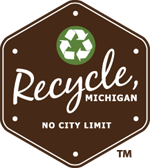Agricultural Film
Where to Recycle: Community Drop-Off Center
The Michigan Recycling Coalition has developed a drop-off program in partnership with the Michigan Department of the Environment, Great Lakes, and Energy to recycle agricultural LDPE and HDPE film from Michigan’s farms and greenhouses. Find out more about how to participate here.
What types of this material qualify for recycling?
Agricultural film is a type of plastic #4 classified as low-density polyethylene (LDPE) or high-density polyethylene (HDPE), also called shrink wrap. Shrink film is used for a variety of agricultural uses with recyclable material including greenhouse and hoop house covers, bunker silo covers, pond liners, drip tape, bale covers, and silage bags.
Why can’t this item go in my curbside bin?
When agricultural films go to a drop off center they can clog and tangle in sorting machinery. Agricultural films can also have increased moisture and silage contamination that can damage equipment. Agricultural films need to go to special facilities where they can be processed separately from other recyclables.
Why is it important to recycle this material?
Agricultural films can take at least 500 years to decompose when exposed to light. Plastic that is buried underground or in a landfill can take 1000 years to degrade. When plastics degrade in our environment, they break down into microscopic bits called microplastics, reducing the soil quality, polluting the water table, and endangering wildlife. Microplastics decrease the number of microbes living beneath the surface that help maintain soil fertility. Plastics in the soil can leach into our drinking water or get eaten by our livestock. Microplastics build up in their fat and can be transferred to whoever eats the meat. Removing microplastics from the environment is impossible once they have been introduced.
Global plastic production has skyrocketed in the last few decades, and plastic pollution is going to remain a significant issue. Huge quantities of agricultural film waste are produced in Michigan every day. Our land and soil are some of our greatest resources, creating a 100-billion-dollar economy with over 47,000 farms. The average Michigan dairy herd has 300 cows and the dairy industry estimates that, on average, 15-20 pounds of all types of waste plastics are used per cow per year.
What is it recycled into?
Plastic Bags, Concrete Mix, Plastic Packaging



